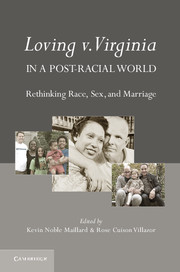Book contents
- Frontmatter
- Contents
- About the Contributors
- Acknowledgments
- Foreword
- Introduction Loving v. Virginia in a Post-Racial World
- Part One Explaining Loving v. Virginia
- Part Two Historical Antecedents to Loving
- Part Three Loving and Interracial Relationships: Contemporary Challenges
- Part Four Considering the Limits of Loving
- Part Five Loving Outside the U.S. Borders
- Part Six Loving and Beyond: Marriage, Intimacy, and Diverse Relationships
- 17 Black v. Gay?
- 18 Beyond the Loving Analogy
- 19 The End of Marriage
- Afterword
- Permission Granted
- Index
- References
19 - The End of Marriage
Published online by Cambridge University Press: 05 July 2012
- Frontmatter
- Contents
- About the Contributors
- Acknowledgments
- Foreword
- Introduction Loving v. Virginia in a Post-Racial World
- Part One Explaining Loving v. Virginia
- Part Two Historical Antecedents to Loving
- Part Three Loving and Interracial Relationships: Contemporary Challenges
- Part Four Considering the Limits of Loving
- Part Five Loving Outside the U.S. Borders
- Part Six Loving and Beyond: Marriage, Intimacy, and Diverse Relationships
- 17 Black v. Gay?
- 18 Beyond the Loving Analogy
- 19 The End of Marriage
- Afterword
- Permission Granted
- Index
- References
Summary
For better and worse, U.S. constitutional law has long expressed the opinion that marriage is essential to both individual and collective well-being. In the 1923 case, Meyer v. Nebraska, the Court ruled that the liberties protected under the doctrine of substantive due process included:
the right … to contract, to engage in any of the common occupations of life, to acquire useful knowledge, to marry, establish a home and bring up children, to worship God according to the dictates of his own conscience, and generally to enjoy those privileges long recognized at common law as essential to the orderly pursuit of happiness by free men.
Sixty-five years later, the Court decided Zablocki v. Redhail and offered its most extensive exposition on the fundamental right to marry. Unlike Meyer, Zablocki was decided under the Equal Protection Clause of the Fourteenth Amendment. In his majority opinion, Justice Marshall argued that:
It is not surprising that the decision to marry has been placed on the same level of importance as decisions relating to procreation, childbirth, child rearing, and family relationships … it would make little sense to recognize a right of privacy with respect to other matters of family life and not with respect to the decision to enter the relationship that is the foundation of the family in our society.
These opinions exemplify the Court’s problematic jurisprudence on marriage: Meyer simply assumes the fundamentality of marriage, whereas Zablocki irrationally presumes that marriage is coterminous with sex, reproduction, and family. Perhaps the most famous of the Court’s marriage cases, Loving v. Virginia, shares these flaws, taking marriage to be fundamental because it wrongly presumes a connection between marriage itself and the beneficial ends that marriage is thought to facilitate. Moreover, Loving most clearly exposes why constitutionalizing marriage is not only erroneous, but also dangerous.
- Type
- Chapter
- Information
- Loving v. Virginia in a Post-Racial WorldRethinking Race, Sex, and Marriage, pp. 253 - 260Publisher: Cambridge University PressPrint publication year: 2012



